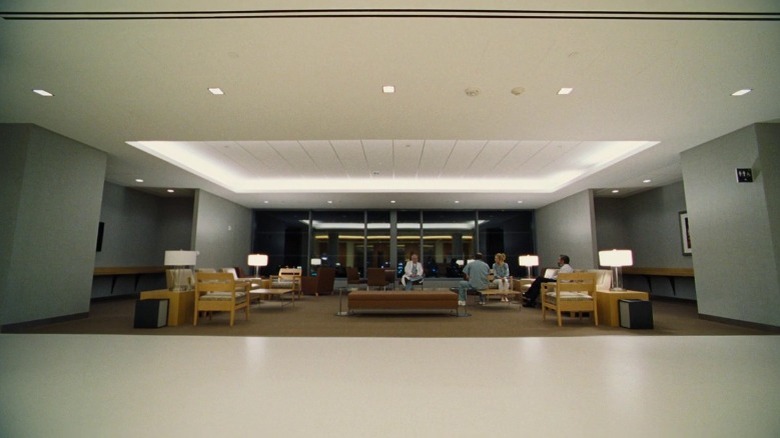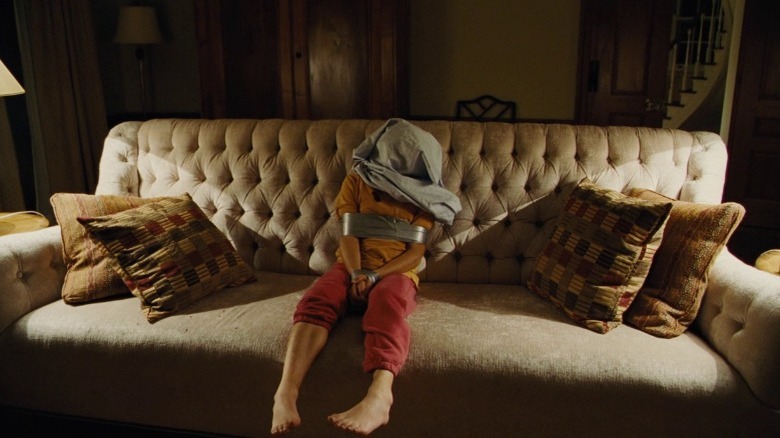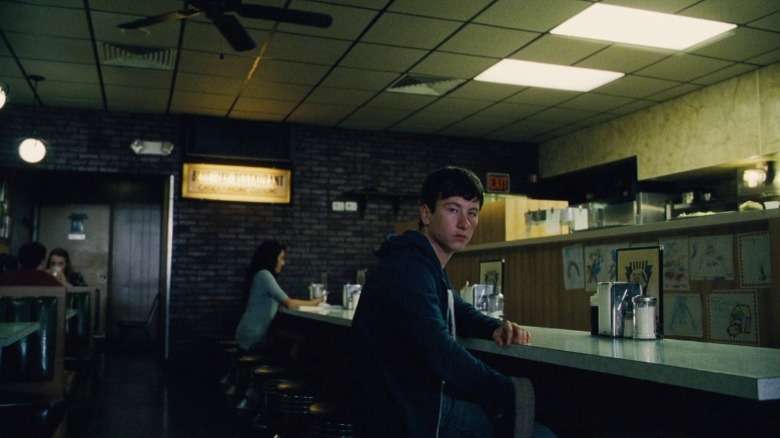The Ending Of The Killing Of A Sacred Deer Explained
Every generation has its share of great auteur filmmakers whose sensibilities could be described as "odd" — but few could claim to be so odd as Yorgos Lanthimos. Each film in the Greek art punk cineaste's portfolio is skin-crawling and alienating in myriad unique ways, yet also enthralling and beguiling in so many others — beginning, or should we say ending, with the fact that they all close out on strange, disarming notes.
If you've seen them, you know it's impossible to forget the ambivalent, ominous triumph of "Alps'" final scene, or the wedge that the closing shot of "The Favourite" drives through the film's ostensible power dynamics, or the dark prelude to a lover's ultimate sacrifice in the concluding minutes of "The Lobster." Lanthimos knows all about the power of suggestion of a great open ending, and almost all of his films' finales leave the viewer with new burning questions, rather than answer any old ones.
The exception would be the 2017 psychological thriller "The Killing of a Sacred Deer," in which Lanthimos sidestepped his own custom by offering up an ending that's perverse not because it's not conclusive, but because it jarringly, uncannily is.
The Killing of a Sacred Deer draws from the ancient tradition of Greek tragedy
Back during its release cycle, "The Killing of a Sacred Deer" was often billed as Yorgos Lanthimos' first out-and-out horror film, causing fans of the director's abrasive, shock-prone style to salivate at the possibilities. In truth, the movie is not exactly that, at least not if we adhere to a purist definition of "horror" — don't go in expecting to be spooked out.
But it is something just as fitting and long-overdue for Lanthimos: A Greek tragedy adaptation. There is, of course, an argument to be made that Greek tragedies, with their deep, seismic catharsis founded on violence, broken taboos, and emotional anguish, are precursors to the emotional mind games played by our era's horror movies. As it would seem, Lanthimos and co-screenwriter Efthymis Filippou recognized that genre link in Euripides' "Iphigenia at Aulis," the play upon which "Sacred Deer" is loosely based. Therefore, they made a movie that fashions the most distressing features of Ancient Greek theater — the suffocating portent, the simmering anger and desperation, the crushing sense of fate's inevitability — into ideal psycho-thriller tools, crafting an airtight atmosphere of mounting dread that seems to be building towards a scary-flick climax for the ages ... only to deliver an ending that's 0% modern horror, 100% ancient drama, without really fitting neatly into either box.
The dryness of Lanthimos' styles reshapes the tragic context
The thing about Yorgos Lanthimos adapting a Greek tragedy is that his style is the one thing Greek tragedies aren't — dry. In an actual Ancient Greek play, a climatic scene like this film's, in which Steven Murphy (Colin Farrell), unable to choose one of his family members to kill, ties them all up and then keeps firing a shotgun at random until a bullet hits his younger son Bob (Sunny Suljic), would be acted out dramatically, punctuated by intense dialogue, and possibly commented-on by a chorus of observers, the better to make sure it delivered the requisite dramatic catharsis.
In the movie, meanwhile, it's a curt, matter-of-fact, almost comically deadpan sequence. The epilogue that follows, in which Steven, Anna (Nicole Kidman), and a cured Kim (Raffey Cassidy) lock eyes with the terrible Martin Lang (Barry Keoghan) as they leave a diner, doesn't add much in the way of emotional revelation.
Why would Lanthimos end the film this way when the premise presented him with arguably the greatest opportunity of his career to deliver a ghastly, unforgettable shock to the audience's system? One possible answer is that, by forgoing catharsis and presenting the climax as a big, messy nothing, he did take the most shocking possible path: Instead of sweating out the story's tension in a final flight of gruesome fancy, he leaves us to marinate in the anguish, unable to process the banality of what just happened.
But there's another, more complicated possible explanation, one that clarifies both the movie's themes and its singular relationship to Greek tragedies.
The whole film is a story about the folly of avoidance
The core themes of Ancient Greek theater are the inevitability of man's fate, and the foolishness of trying to outrun it. If you're a protagonist in a Greek tragedy, no matter what, life is catching up to you (via Pen & the Pad). Euripides' "Iphigenia at Aulis" complicates this overarching theme by positing the characters' own belief in it as the very thing that seals their doom: The sacrifice of Iphigenia to the goddess Athena becomes inevitable because the characters believe that it is inevitable, and use that as an excuse to avoid dealing with the crises that come their way (via LitCharts).
Lanthimos and Filippou were faithful to this element of "Iphigenia" in their adaptation. "The Killing of a Sacred Deer'"s protagonist is also a man doomed by avoidance. When Martin tells him that all of his family members will die unless he chooses one to kill, Steven reacts by getting on with his life and hoping the problem will go away. When it doesn't, he tries to force Martin to reverse the curse, knowing full well that's not possible. The whole time, Steven avoids taking responsibility for the film's two central problems: The need to reckon with the curse's mandate, and the part he played in the death of Martin's father. He's lived a life of privilege and averted accountability, and now, finally, fate is holding him accountable. The film is the story of him trying to weasel his way out once again, only to be crushed by the dark truth this failed attempt reveals about him.
Contrary to most Greek tragedies, this one hinges on a lack of catharsis
If the characters of "Iphigenia at Aulis" believe themselves to be at the mercy of fate, Steven believes he's at the mercy of something even darker: chaos. He's used to skating by his own life, acting out his professional and personal lives robotically, not really caring deeply about anything, not his patients, not his family — as demonstrated by his dejected reaction to his children's early-stage symptoms of the curse. Unlike King Agamemnon or Iphigenia, he doesn't feel that tragedy is inevitable; he simply feels that it doesn't matter either way.
Ironically, it's precisely the curse that reminds him of his love for his own family. But, by this point, he's lived a whole life of carelessness, and who knows how many other cases like Martin's father's he might have swept under the rug in that time. It's too late. The chaos he's deferred to is claiming its price.
And yet, Martin is so unable to see what has brought him to this point that he insists on shirking responsibility. He leaves his wife and children to scramble desperately for a way to handle the situation, continues to keep mum on his medical neglect, and bides his time, still trapped in his old ways. His tragedy is as much a tragedy of fate as it is a tragedy of character — the only way it could end would be with a scene of rushed, haphazard, horrifyingly meaningless resolution, which "solves" the plot without really solving anything. Leave it to Yorgos Lanthimos to spin a Greek tragedy that derives its impact from the lack of catharsis.
Stream "The Killing of a Sacred Deer" on Netflix along with the other top thrillers they have available.




